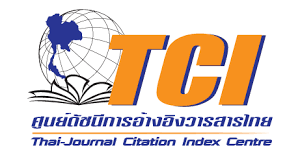รูปแบบความสัมพันธ์เชิงสาเหตุของกรรมการตรวจสอบที่เป็นอดีตข้าราชการ กับการใช้ดุลพินิจของผู้บริหารในการจัดการกำไรที่แท้จริง
คำสำคัญ:
กรรมการตรวจสอบ, อดีตข้าราชการ, การจัดการกำไรที่แท้จริง, โมเดลความสัมพันธ์เชิงสาเหตุบทคัดย่อ
การวิจัยนี้มีวัตถุประสงค์เพื่อ 1) ตรวจสอบความสอดคล้องกลมกลืนของรูปแบบความสัมพันธ์เชิงสาเหตุของกรรมการตรวจสอบที่เป็นอดีตข้าราชการกับการใช้ดุลพินิจของผู้บริหารในการจัดการกำไรที่แท้จริง 2) วิเคราะห์อิทธิพลของกรรมการตรวจสอบที่เป็นอดีตข้าราชการที่มีต่อการใช้ดุลพินิจของผู้บริหารในการจัดการกำไรที่แท้จริง โดยใช้ข้อมูลงบการเงินของบริษัทจดทะเบียนในตลาดหลักทรัพย์แห่งประเทศไทยตั้งแต่ปี พ.ศ. 2560 – 2564 จำนวน 1,205 ตัวอย่าง และวิเคราะห์ข้อมูลโดยใช้โมเดลสมการโครงสร้าง ผลการวิจัยพบว่า 1) รูปแบบความสัมพันธ์เชิงสาเหตุของกรรมการตรวจสอบที่เป็นอดีตข้าราชการกับการใช้ดุลพินิจของผู้บริหารในการจัดการกำไรที่แท้จริงที่พัฒนาขึ้นมีความสอดคล้องกลมกลืนกับข้อมูลเชิงประจักษ์อย่างมีนัยสำคัญทางสถิติ (x2 = 1.985, df = 2, x2 /df = .992, GFI = .997, AGFI = .984, IFI = 1.000, CFI = 1.000, RMSEA =.000) 2) การมีอำนาจในการควบคุมของผู้บริหารมีอิทธิพลเชิงบวกต่อการจัดการกำไรที่แท้จริง 3) กรรมการตรวจสอบที่เป็นอดีตข้าราชการมีอิทธิพลเชิงบวกต่อการมีอำนาจในการควบคุมของผู้บริหาร 4) กรรมการตรวจสอบที่เป็นอดีตข้าราชการและมีเชี่ยวชาญทางด้านบัญชี การเงิน และการควบคุมภายในไม่มีอิทธิพลเชิงบวกต่อการมีอำนาจในการควบคุมของผู้บริหาร ผลลัพธ์การวิจัยนี้จะนำไปสู่ข้อเสนอแนะเชิงนโยบายให้กับหน่วยงานกำกับดูแลเพื่อนำไปพิจารณาในการกำกับดูแลกิจการที่ดีต่อไป
เอกสารอ้างอิง
กนต์ณัฐ ปู่เกตุแก้ว. (2564). กรรมการและกรรมการตรวจสอบที่เป็นอดีตข้าราชการหรือนักการเมือง ความสัมพันธ์กับการใช้ดุลยพินิจของประธานเจ้าหน้าที่บริหารและการจัดการกําไรด้วยการสร้างรายการทางธุรกิจ. จุฬาลงกรณ์ธุรกิจปริทัศน์. 43(4), 60-75.
เกรียงไกร บุญเลิศอุทัย ศิลปพร ศรีจั่นเพชร และ อนุวัฒน์ภักดี. (2564). คุณภาพคณะกรรมการมีผลต่อความมีเสถียรภาพกําไรในกิจการขนาดเล็ก: กรณีศึกษาบริษัทจดทะเบียนในตลาดหลักทรัพย์แห่งประเทศไทย. วารสารบริหารธุรกิจ. 44(169), 3-20.
ตลาดหลักทรัพย์แห่งประเทศไทย. (2560). หลักการกำกับดูแลกิจการที่ดีสำหรับบริษัทจดทะเบียน ปี 2560. สืบค้นเมื่อ 2 ธันวาคม 2565, จาก https://www.sec.or.th/cgthailand/TH/Documents/Regulation/CGCode.pdf
ตลาดหลักทรัพย์แห่งประเทศไทย. (2553ข.). คู่มือคณะกรรมการตรวจสอบ. สืบค้นเมื่อ 2 ธันวาคม 2565, จาก
https://www.sec.or.th/cgthailand/TH/Documents/Regulation/AChandbook.pdf
ธีระ เทิดพุทธธรรม. (2561). ตัวกำหนดการกำกับดูแลกิจการที่ดีที่มีต่อผลการดำเนินงานการบริหารด้านการเงินของบริษัทจดทะเบียนในประเทศไทย. วิทยานิพนธ์ ปรัชญาดุษฎีบัณฑิต สาขาวิชาการจัดการภาครัฐและเอกชน, มหาวิทยาลัยคริส
เตียน.
อนุวัฒน์ ภักดี และ ศิลปพร ศรีจั่นเพชร. (2564). ผลกระทบของคุณลักษณะคณะกรรมการตรวจสอบต่อการจัดการกำไรที่แท้จริง: หลักฐานจากบริษัทจดทะเบียนในตลาดหลักทรัพย์แห่งประเทศไทย. วารสารวิชาการ มหาวิทยาลัยหอการค้าไทย. 41(4), 1-26.
Abid, G., Khan, B., Rafiq, Z. & Ahmed, A. (2014). Theoretical Perspectives of Corporate Governance. Bulletin of Business and Economics, 3(4), 166-175.
Abou-Moghli, A. A., & Al-Kasasbeh, M. M. (2012). Social Network and The Success of Business Start- Up. International Journal of Business and Management, 7(9), 134-140.
Al-Absy, M. S. M., KuIsmail, K. N. I., & Chandren, S. (2019). Audit Committee Chairman Characteristics and Earnings Management: The Influence of Family Chairman. Asia-Pacific Journal of Business Administration, 11(4), 339-370.
Almashaqbeh, A. A., Abdul-Jabbar, H. & Shaari, H. (2018). Real Earnings Management and Tax Considerations: A Conceptual Analysis. International Journal of Business Management and Commerce, 3(2), 25-35.
Aloui, M., & Jarboui, A. (2018). The Effects of Corporate Governance on The Stock Return Volatility: During the Financial Crisis. International Journal of Law and Management, 60(2), 478–495.
Baker, T. A., Lopez, T. J., Reitenga, A. L., & Ruch, G. W. (2019). The Influence of CEO and CFO Power on Accruals and Real Earnings Management. Review of Quantitative Finance and Accounting, 52 (1), 325–345.
Beyer, B.D., Nabar, S.M., & Rapley, E.T. (2018). Real Earnings Management by Benchmark-Beating Firms: Implications for Future Profitability. Accounting Horizons, 32(4), 59-84.
Dechsukhum, A., Tangeakchit, M. & Laohavisudht, S. (2022). Relationship Between Audit Committee Characteristics and Accounting Conservatism of Listed Companies in The Stock Exchange of Thailand. Songklanakarin Journal of Management Sciences, 39(2), 163-182.
Dinh, T. Q., & Calabrò, A. (2019). Asian Family Firms Through Corporate Governance and Institutions: A Systematic Review of The Literature and Agenda for Future Research. International Journal of Management Reviews, 21(1), 50–75.
Emerson, M. R. (1976). Social Exchange Theory. Annual Review of Sociology, 2(1976), 335-362.
Fan, P. H. J., Wong, T. J. & Zhang, T. (2007). Politically Connected CEOs, Corporate Governance, and Post-IPO Performance of China's Newly Partially Privatized Firms. Journal of Financial Economics, 84(2), 330-357.
Ghaleb, B. A. A., Kamardin, H., & Tabash, M. I. (2020). Family Ownership Concentration and Real Earnings Management: Empirical Evidence from an Emerging Market. Cogent Economics and Finance, 8(1), 1-17.
Hair, J. F., Howard, M. C., & Nitzl, C. (2020). Assessing Measurement Model Quality in PLS-SEM Using Confirmatory Composite Analysis. Journal of Business Research, 109(5–6), 101–110.
Hair, J. F., Ringle, C. M., & Sarstedt, M. (2013). Partial Least Squares Structural Equation Modeling: Rigorous Applications, Better Results and Higher Acceptance. Long Range Planning, 46(1-2), 1-12.
Hillman, A.J., Withers, M.C. & Collins, B.J. (2009). Resource Dependence Theory: A Review. Journal of Management, 35(6), 1404-1427.
Imai, M. (2006). Mixing Family Business with Politics in Thailand. Asian Economic Journal, 20(3), 241–256.
Jamil, N. N. (2020). The Power of Political Connections: Review on The Impacts of Audit Committee and Corporate Governance. Journal of Public Administration and Governance, 10(1), 1-14.
Jensen, M. C., & Meckling, W. H. (1976). Theory of The Firm: Managerial Behavior, Agency Costs and Ownership Structure. Journal of Financial Economics, 3(4), 305-360.
Jing, J. (2019). Does Risk Management Committee Gender Diversity Matter? A Financial Problems Perspective. Managerial Auditing Journal, 34(8), 1050-1072.
Kelloway, E. K. (2015). Using Mplus for Structural Equation Modeling. Thousand Oaks, CA: Sage.
Lin, T., Hutchinson, M., & Percy, M. (2015). Earnings Management and The Role of The Audit Committee: An Investigation of The Influence of Cross-Listing and Government Officials on The Audit Committee. Journal of Management and Governance, 19(1), 197-227.
Marzuki, M. M., Haji-Abdullah, N. M., Othman, R., Wahab, E. A., & Harymawan, I. (2019). Audit Committee Characteristics, Board Diversity, and Fraudulent Financial Reporting in Malaysia. Asian Academy of Management Journal, 24(2), 143–167.
Minnick, K., & Noga, T. (2010). Do Corporate Governance Characteristics Influence Tax Management.? Journal of Corporate Finance, 16(5), 703–718.
Pfeffer, J., & Salafncik, G. R. (2003). The External Control of Organizations: A Resource Dependence Perspective. Stanford University Press.
Qamhan, M. A., Che Haat, M. H., Hashim, H. A., & Salleh, Z. (2018). Earnings Management: Do Attendance and Changes of Audit Committee Members Matter? Managerial Auditing Journal, 33 (8/9), 760-778.
Roychowdhury, S. (2006). Earnings Management through Real Activities Manipulation. Journal of Accounting and Economics, 42(3), 335–370.
Sultana, N. (2015). Audit Committee Characteristics and Accounting Conservatism. International Journal of Auditing, 19(2), 88-102
Teng, L., Marion H., & Majella P., (2015). Earnings Management and The Role of The Audit Committee: An Investigation of The Influence of Cross-Listing and Government Officials on The Audit Committee. Journal of Management & Governance, Springer; Accademia Italian di Economia Azaindole (AIDEA), 19(1), 197-227.
The ASX Corporate Governance Council. (2019). Corporate Governance Principles and Recommendations. Retrieved 2 December 2022, from https://www.asx.com.au/documents/asx-compliance/cgc-principles-and-recommendations-fourth-edn.pdf
The Organization for Economic Co-operation and Development. (2021). Corporate Governance 2021. Retrieved 2 December 2022, from https://www.oecd.org/corporate/OECD-Corporate-Governance-Factbook.pdf
Wasserman, S. & Faust, K. (1994). Social Network Analysis: Methods and Applications. Cambridge: Cambridge University Press.
Watts, R. L., & Zimmerman, J. L. (1986). Positive Accounting Theory. London: Prentice-Hall Inc.
Yonus Z. I. & Klein, C. (2019). Board Composition and Corporate Risk-Taking: A Review of Listed Firms from Germany and the USA. Journal of Applied Accounting Research, 20(4), 526–542.






